Microbiology Laboratory
The educational and scientific microbiology laboratory was established in September 2016.
It operates at the Department of Histology and Medical Biology of the medical faculty.
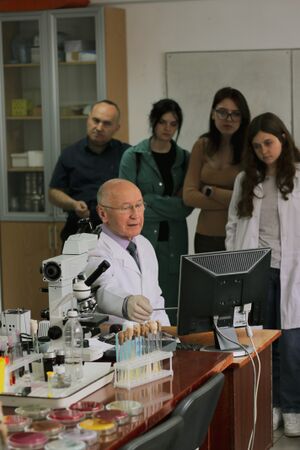
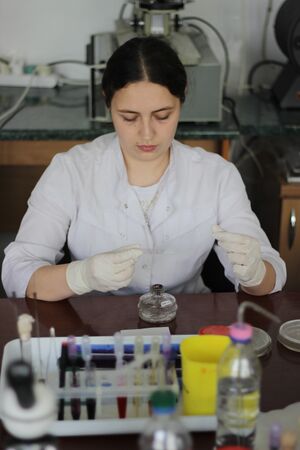
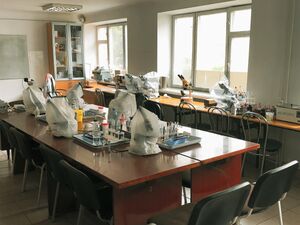
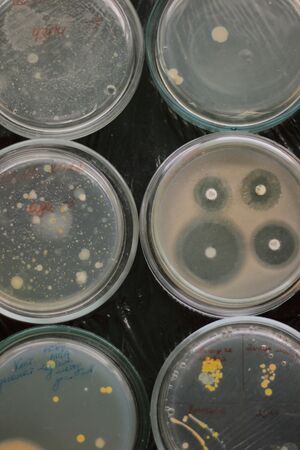
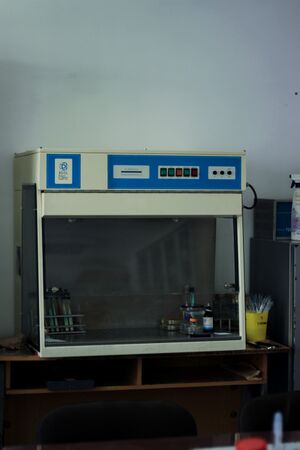
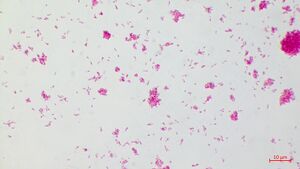
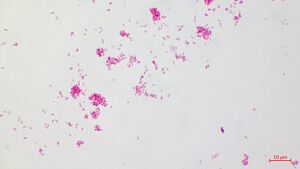
Laboratory Documentation
- Regulations of the Educational and Scientific Microbiology Laboratory.
- Program for the Introductory Briefing.
- Instruction No. 1 on Labor Safety and Environmental Protection.
- Instruction No. 2 on Providing First Aid.
- Instruction No. 13 on Labor Safety While Working with Computers.
- Instructions No. 37, 38, 39.
- Work Plan of the Educational and Scientific Microbiology Laboratory for the 2023-2024 Academic Year.
Staffing
The laboratory employs:
- Petro Kostiantynovych Boiko, Doctor of Veterinary Sciences, Professor, Head of the Laboratory;
- Oksana Petrivna Boiko, Candidate of Veterinary Sciences, Senior Lecturer;
- Olha Vasylivna Kostiielova, Candidate of Biological Sciences, Senior Lecturer;
- Nina Viktorivna Tarasiuk, Senior Laboratory Assistant;
- Olha Viktorivna Panivska, Graduate Student;
- Bohdan Andriyovych Poruchynskyi, Graduate Student.
Educational Components
The laboratory provides laboratory and practical sessions for students of the Medical Faculty, Faculty of Biology and Forestry:
- Diagnosis of Infectious Diseases (Maryna Yuriyivna Myronets)
- Medical Microbiology, Virology, and Immunology (Petro Kostiantynovych Boiko)
- Microbiology and Virology (Olha Viktorivna Panivska)
- Microbiology with Basics of Immunology (Oksana Petrivna Boiko)
- VOC Microbiology with Research Result Assessment (Petro Kostiantynovych Boiko).
Methods
The laboratory uses the following methods:
- Light microscopy (phase contrast, dark field, fluorescence);
- Immunological methods for diagnosing viral and bacterial diseases (agglutination test, indirect hemagglutination, precipitation reaction, immunodiffusion);
- Immunofluorescence microscopy;
- Study of the biological activity of soil;
- Cultivation of microorganisms in liquid, solid, and semi-solid media;
- Determining the total number of microorganisms in air, water, and soil;
- Determining sanitary indicator microorganisms in environmental objects.
Laboratory Equipment
- MICROmed XS-2610 laboratory microscope – 5 units;
- BIOLAR (POLAND) microscope – 3 units;
- Binocular stereoscopic microscope MBS-10 – 1 unit;
- Binocular stereoscopic microscope MBS-10 – 1 unit;
- Video camera for microscope MICROmed XS-5520 – 1 unit;
- LOMO ML-3 fluorescence microscope – 1 unit;
- LOMO ML-RPO-11 fluorescence microscope – 1 unit;
- Autoclave VK-75 – 1 unit;
- Autoclave MG-20 – 1 unit;
- Autoclave GK-10 - 1 unit;
- Drying oven – 1 unit;
- Desktop box – 2 units;
- Thermostat TC-80 – 3 units;
- OPN-8 laboratory centrifuge – 2 units;
- PENTIUM computer – 1 unit;
- Electrophoresis device PEF-5 – 1 unit;
- Photoelectrocolorimeter FEK-56M – 1 unit;
- Electronic scales – 2 units;
- Laboratory glassware dryers – 2 units;
- Laboratory cabinets and shelves – 5 units;
- Laboratory tables – 10 units;
- Snaige 200L refrigerator – 1 unit;
- Chemical glassware sets;
- Canon MF3010 printer – 1 unit;
- Chemicals;
- Dyes;
- Laboratory instruments;
- DE-10 distiller – 1 unit.
Research Activities
The laboratory conducts research on the following topics:
- Study of morphological traits, tintorial, cultural, and biochemical properties of microorganisms in the composition of the bacterial fertilizer "Azoter";
- Study of morphological traits, tintorial, cultural, and biochemical properties of bacteria of the genus Agrobacterium sp., the causative agent of raspberry cancer;
- Isolation of nitrogen-fixing bacteria from the natural environment and study of their physiological and biochemical properties;
- Study of the microbiota and isolation of conditionally pathogenic microorganisms from sapropel;
- Development of erythrocyte diagnostic tools for detecting the level of antibodies against the causative agent of salmonellosis in RNGA (indirect hemagglutination reaction);
- Study of infectious and epidemic processes in mycobacteriosis;
- Study of the biological properties of the avirulent strain Ch. chauvoli;
- Study of the ecology of mycobacteria – potential causative agents of mycobacteriosis;
- Study of the biochemical properties of E. coli.
Scientific Clubs, Problem Groups
The laboratory hosts theStudent Scientific Club in Microbiology, Virology, and Immunology (leader – Senior Lecturer Olha Viktorivna Panivska)
Events
The Educational and Scientific Microbiology Laboratory participates annually in the university's “Science Days”.
The following events were held at the laboratory:
- Open seminar (Workshop) "Technique of microbiological material inoculation" (PhD S.V. Dyakiv).
- Open master class "Educational and Scientific Microbiology Laboratory of Lesya Ukrainka University. Conducting Research". (DVM P.K. Boiko, PhD O.V. Kostelova, PhD O.P. Boiko).
On May 18, 2023, laboratory staff actively participated in the university camp event "Health and Mental Wellbeing: How to Take Care of Yourself During War" as part of the Medical Faculty Week.
Scientific Work
In the last 5 years, the following scientific papers have been published:
- Boiko P.K., Shevchuk V.M., Stepaniuk Y.V., Boiko O.P., Solovey L.V., Panivska O.V. Mycobacteriosis in cattle: Pathomorphological changes in peripheral immune system organs. Medical and Epidemiological Significance. Modern Biology Notes. 2023. No.1 (5). P. 37-44.
- Boiko P.K., Shevchuk V.M., Stepaniuk Y.V., Boiko O.P., Solovey L.V., Panivska O.V. Mycobacteriosis in cattle: Pathomorphological changes in peripheral immune system organs. Medical and Epidemiological Significance. Modern Biology Notes. 2023. No.1 (5). P. 37-44.
- Olha Panivska, Viktor Shevchuk. Epidemiological Situation of Mycobacteriosis in Ukraine and Worldwide at the Beginning of the 21st Century: A Literature Review. Bulletin of Medical and Biological Research. 2024. Vol. 6, No. 2. P. 63-71.
- Panivska O.V. On the Nature of Parallergic Reactions to Tuberculin in Cows at Dairy Farms. Modern Biology Notes. 2024. Vol. 8, No. 2. P. 115-120.
- Boiko O., Tytiuk O., Panivska O., Poruchynskyi B., Boiko P. The Potential of the Immunofluorescence Method in Laboratory Diagnosis of Infectious Diseases. Modern Biology Notes. 2021. No. 1 (1). P. 93-101.
- Boiko P.K. The Effects of Mospilan and Aktara Insecticides in Feed on Egg Production and Meat Quality of Laying Hens / Dukhnytskyi V., Bazaka G., Sokolyuk V., Boiko P., Ligomina I. // J. World Poultry Res. – Vol. 9. ‒ No. 4. – 2019. – P. 233–239.
- Boiko P.K. Analysis of Spatial and Temporal Dynamics of the Epizootic Process of Blackleg in Ukraine / P.K. Boiko, V.M. Sokolyuk, O.P. Boiko, V.I. Koziy, A.M. Fedorchenko // Ukrainian Journal of Ecology. – 2020. – Vol. 10. – Is. 2. – P. 205–215.
- The Acute Toxicity Assessment of Mospilan RP and Actara 25 WG for White Mice / V. Dukhnytskyi, G. Bazaka, V. Sokolyuk, P. Boiko, I. Ligomina // J. World Poult. Res. 2020. – 10 (2). – P. 332-339.
- Boiko, O., Tytiuk, O., Panivska, O., Poruchynsky, B., & Boiko, P. (2021). Capability of the Immunofluorescence Method for the Laboratory Diagnostics of Infectious Diseases. Notes in Current Biology, (1 (1), 93–101. https://doi.org/10.29038/NCBio.21.1.93-101
Contact Information
- Lutsk, Bankova St., 9, Building C (2nd floor, Room No. 214).
- email: boyko.petro@vnu.edu.ua
- email: Nina.Tarasyuk@vnu.edu.ua
- Working hours of the Educational and Scientific Microbiology Laboratory:
| Monday | 8:15 - 12:00 | 12:48 - 17:15 |
| Tuesday | 8:15 - 12:00 | 12:48 - 17:15 |
| Wednesday | 8:15 - 12:00 | 12:48 - 17:15 |
| Thursday | 8:15 - 12:00 | 12:48 - 17:15 |
| Friday | 8:15 - 12:00 | 12:48 - 16:15 |
| Saturday | Day off | |
| Sunday | Day off | |